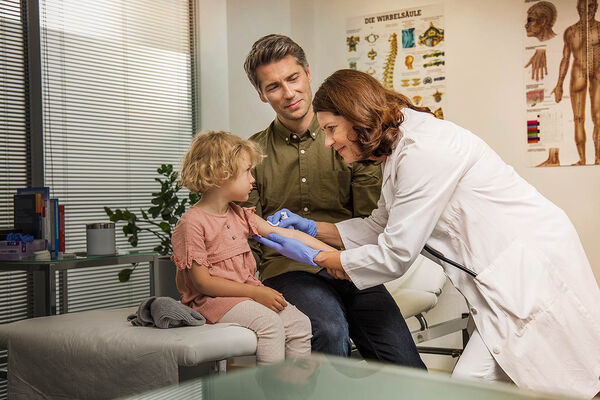Vaccinations for children
The best protection from the outset with vaccinations
Most parents in Germany choose to have their children vaccinated, which is why 95% of children have received their essential basic vaccinations by the time they start school according to school-entry examination statistics. Nevertheless, many parents do not find it easy to make the decision on whether or not to have their child vaccinated. Can childhood diseases really be so dangerous? And what about the potential side effects of vaccinations?
It’s entirely normal to ask yourself these types of questions, but there’s something you should always remember: the more people are vaccinated, the less likely it will be for diseases to spread. Ultimately, they will fall into oblivion and be considered harmless. The potential side effects of vaccinations, on the other hand, are often seen in a very critical light. People often forget that supposedly harmless childhood diseases such as measles are highly contagious and can have serious consequences – particularly for adults.
We have put together a summary of the most essential information regarding the benefits and potential side effects of vaccinations for children, as recommended by the experts at the Standing Committee on Vaccination (STIKO), so that you can make the right decision as a parent.
| Vaccination | Age: 2 months | Age: 3 months | Age: 4 months | Age: 11–14 months | Age: 15–23 months |
|---|---|---|---|---|---|
| Tetanus (lockjaw) | 1st | 2nd | 3rd | 4th | |
| Diphtheria | 1st | 2nd | 3rd | 4th | |
| Pertussis (whooping cough) | 1st | 2nd | 3rd | 4th | |
| Hib (haemophilus influenzae type B) | 1st | 2nd | 3rd | 4th | |
| Polio (poliomyelitis) | 1st | 2nd | 3rd | 4th | |
| Hepatitis B | 1st | 2nd | 3rd | 4th | |
| Pneumococcus | 1st | 2nd | 3rd | ||
| Rotaviruses | 1st | 2nd | 3rd (if necessary) | ||
| Meningococcal C | Once from 12 months | ||||
| Measles, mumps, rubella (MMR) | 1st | 2nd | |||
| Chickenpox (varicella) | 1st | 2nd | |||
| Cervical cancer (HPV) | |||||
| Flu (influenza) | Annually in the event of chronic illness | Annually in the event of chronic illness |
If any vaccinations have been missed, your child can still go back for these at any time up to and including the age of 17.
| Vaccination | Age: 2–4 years old | Age: 5–6 years old | Age: 9–14 years old | Age: 15–17 years old |
|---|---|---|---|---|
| Tetanus (lockjaw) | 1st booster | 2nd booster | ||
| Diphtheria | 1st booster | 2nd booster | ||
| Pertussis (whooping cough) | 1st booster | 2nd booster | ||
| Hib (haemophilus influenzae type B) | ||||
| Polio (poliomyelitis) | Booster | Booster | ||
| Hepatitis B | ||||
| Pneumococcus | ||||
| Rotaviruses | ||||
| Meningococcal C | ||||
| Measles, mumps, rubella (MMR) | ||||
| Chickenpox (varicella) | ||||
| Cervical cancer (HPV) | 1st and 2nd | |||
| Flu (influenza) | Annually in the event of chronic illness | Annually in the event of chronic illness | Annually in the event of chronic illness | Annually in the event of chronic illness |
If any vaccinations have been missed, your child can still go back for these at any time up to and including the age of 17.
Here’s how to have your child vaccinated
Make an appointment with your paediatrician and take your child’s vaccination record with you. The paediatrician will advise you on the recommended vaccinations and carry out the ones you choose to have. We cover the costs of all vaccinations recommended by STIKO; all you have to do is show your child’s SBK health care card to the doctor.
